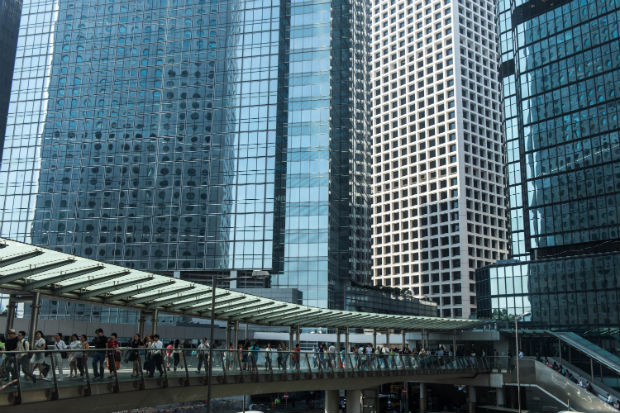Protests could hurt Hong Kong economy – World Bank

Commuters return to work at the start of a new week in Hong Kong on October 6, 2014, as pro-democracy protestors continue to occupy a nearby flyover. AFP
SINGAPORE – Protests in Hong Kong could hurt the city’s economy – as well as China’s – but the impact will depend on how long the “uncertainty” lasts, the World Bank’s chief Asia economist said Monday.
Sudhir Shetty said the Bank was closely monitoring the events in Hong Kong, where thousands of pro-democracy protesters have paralyzed major streets for more than a week, leading to a tense standoff with the government.
“Obviously we, like every other set of economic analysts, are looking very closely at the situation and following it and looking at its impact,” he told reporters in Singapore.
“The impacts will be both on the Hong Kong Special Administrative Region itself, their economy, but also in terms of the broader impact on the Chinese economy,” he added.
“As of now, what we anticipate is obviously a greater impact on Hong Kong SAR – so slower growth in 2014 than was being anticipated earlier.”
Article continues after this advertisementShetty added that “at this stage, our best estimates… are that there isn’t as yet significant spillover to the broader Chinese economy, but it is still something that we and others will continue to watch”.
Article continues after this advertisementThe Bank does not have a forecast for Hong Kong’s economic growth because it covers only developing economies.
But it forecast Chinese growth to ease to 7.4 percent this year and 7.2 percent in 2015 from 7.7 percent last year.
Shetty said Hong Kong is a “high-income” economy comparable to Taiwan.
“The only point I would make is that both the short-term impacts on growth as well as the more medium-term impact on its role as a financial center will depend obviously very much on how the current uncertainty plays out,” he said.
“Other things being equal, uncertainty is not a good thing for economic activity.”
Hong Kong civil servants returned to work at the government’s headquarters Monday as the protests – which saw tens of thousands hit the streets last week – subsided in the face of a deadline to disperse.
But although numbers dwindled dramatically at the main protest sites, many said they would return later in the day to resume their campaign for free elections.
The government was forced to shut its headquarters on Friday – leaving 3,000 civil servants at home – because of the massed ranks of protesters blocking the access roads.
The city’s chief executive Leung Chun-ying had insisted the offices must reopen on Monday, warning he would “take all necessary actions to restore social order”.
There were ugly scenes a week ago when police unleashed tear gas on the crowds, but the action only galvanized more protesters to join.
The People’s Daily newspaper, the official mouthpiece of China’s Communist Party, on Monday slammed the demonstrations as “driving democracy backwards”, while state media continued to emphasize disruption they have caused.